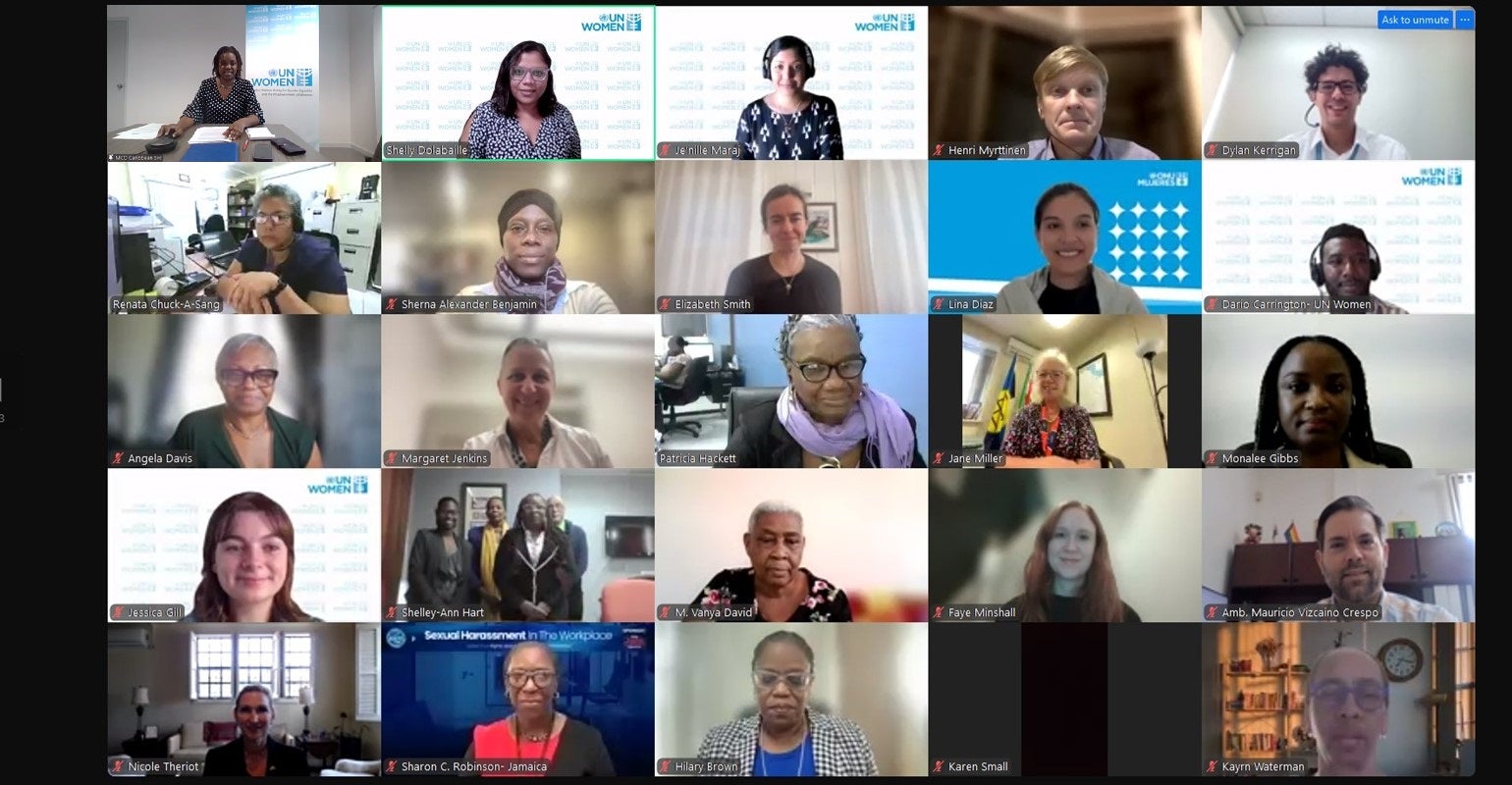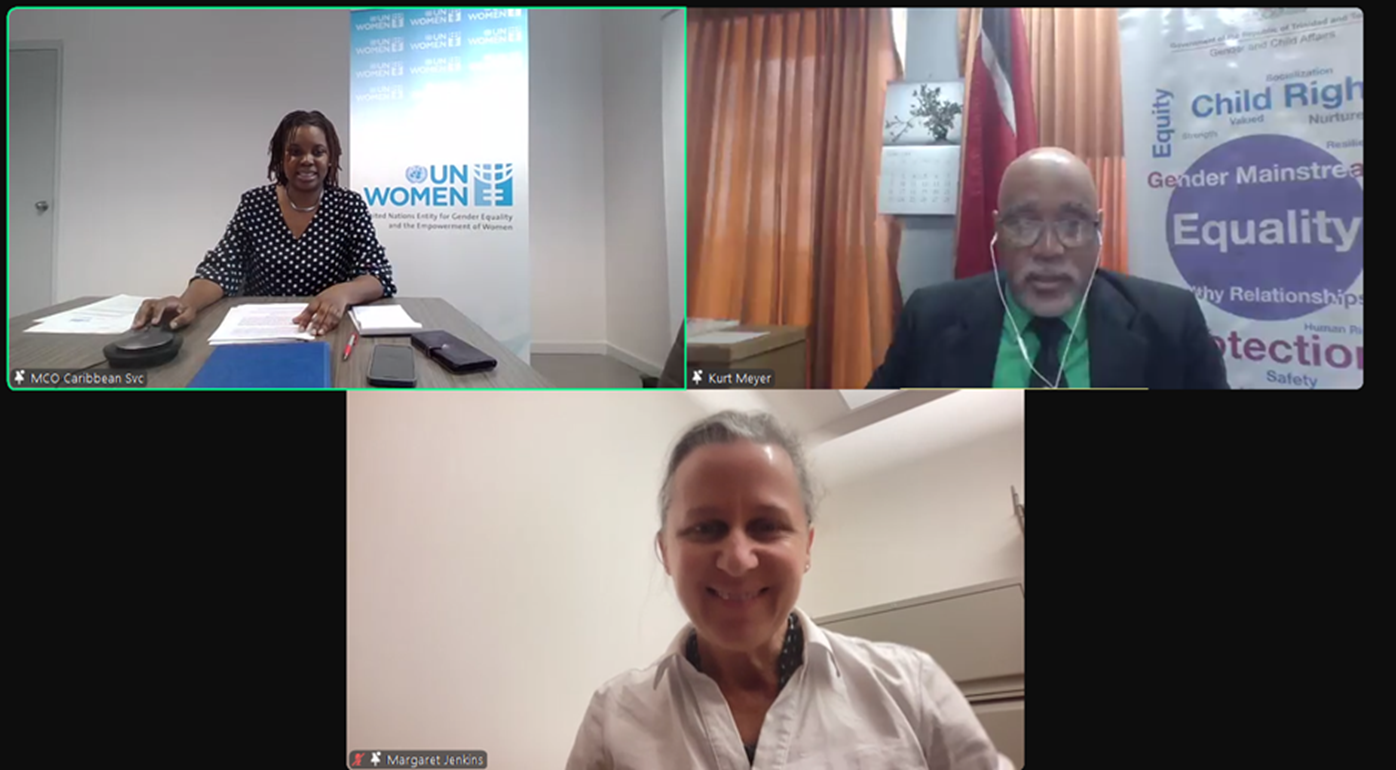Strengthening Citizen Security in the Caribbean: Examining the Role of Women in Peacebuilding
Date:
Recognising the urgent need to address security challenges in the Caribbean through inclusive processes that include women’s experiences, priorities and voices, UN Women, in collaboration with CARICOM and the Foreign, Commonwealth & Development Office of the United Kingdom (FCDO UK), convened a high-level regional consultation on Women, Peace, and Security (WPS). The virtual event brought together government officials from CARICOM Member States, civil society leaders, development partners, and members of the diplomatic corps to explore how gender perspectives can be further integrated into national and regional peace and security efforts.

Security Challenges in the Caribbean
The Caribbean faces an evolving security landscape marked by an increase in gun violence, organised crime, and the proliferation of small arms. The involvement and impact on men and boys are reported more often, but there is much less focus on the fact that women and girls are also impacted and the reasons why. The break down in the social fabric and communities due to wider societal violence has gendered causes and effects including alarmingly high levels of gender-based violence with regional prevalence rates matching or exceeding the global average. Additionally, climate change has intensified vulnerabilities, exacerbating inequalities and increasing risks for marginalised populations.
Women’s Role in Peace and Security
The global conversation on peace and security has increasingly recognised that sustainable solutions cannot be achieved without equal participation and full involvement of women in all efforts of maintaining and promoting peace and security. Around the world, when women participate in peace processes, agreements are 35% more likely to last at least 15 years. Despite this evidence, women remain underrepresented in negotiation, mediation, and conflict resolution in addressing key security issues such as social cohesion and crime and violence- key components of the WPS agenda. This gap can limit the region’s ability to effectively tackle security threats and build resilient societies.

Isiuwa Iyahen, Head of Office a.i. for UN Women Multi-Country Office highlighted the intersection of WPS and the Beijing Declaration and Platform for Action: "Celebrating its 30th year, the Beijing Declaration and Platform for Action remains a comprehensive policy agenda for achieving gender equality, offering a roadmap to address the root causes of gender-based violence and ensuring women's voices are heard in all areas of life. It underscores the critical role of women in conflict prevention, resolution, and peacebuilding. The WPS agenda and the BPfA are closely linked in their shared commitment to advancing gender equality and women's rights. Both frameworks stress the importance of women's full, equal, and meaningful participation in decision-making, especially in conflict prevention, resolution, and peacebuilding”.
Faye Minshall, Regional Gender and Equalities Adviser at FCDO, emphasised the importance of advancing the WPS agenda: "Historically the WPS agenda has been seen as a policy for active conflict but we know that conflict doesn’t emerge from nowhere - there is a buildup and inequality is usually at its core. The WPS agenda is at its most powerful when we are talking about prevention of violence. A core part of the UK's efforts overseas is on supporting other countries to adopt WPS NAPs (National Action Plans), which we see as a unique vehicle to coordinate cross-government activity on peace and security and ensure gender sensitivity is embedded."

Expert Insights
The consultation featured expert presentations, discussions on regional security threats, and lessons learned from Latin America and the Caribbean. During a panel discussion on The WPS Journey: Roadmaps to Action Plans on WPS and Key Lessons Learned, Dr. Margaret Jenkins, an international consultant specialising in gender equality and security issues and a senior fellow at the University of Ottawa shared that data shows that when WPS is integrated into the security sector, it gets the results by effectively providing tools and resources to regions, countries and communities to respond to root causes, such as understanding how crime and violence engage and impact women, girls, boys and men and those from marginalised groups differently.
A key highlight was the focus on Trinidad and Tobago’s upcoming launch of the first National Action Plan (NAP) on Women, Peace, and Security, marking a significant step toward institutionalising UN Security Council Resolution 1325 on Women, Peace and Security in the Caribbean.
Mapping Security Challenges and Entry Points
Participants engaged in interactive group discussions to map the region’s security challenges, analyse their alignment with the WPS’ four key pillars of participation, protection, prevention and relief and recovery, identifying strategic entry points for policy interventions. Themes included gun and gang-related crime and violence, risk prevention strategies beginning with interventions through the education system, community and wider security risks, gender-based violence; vulnerability of migrant populations and a comprehensive multi-sectoral justice, education and health approach to prevent and respond to these.
The insights and recommendations generated at the Consultation will inform future policy discussions and initiatives aimed at strengthening peacebuilding efforts in the Caribbean amplified by the benefits of integrating the Women, Peace, and Security agenda.